
BY MARLA HOLT
Nearly every media outlet is in the college rankings game, handing out superlatives like candy on Halloween. Ubiquitous though they are, these rankings are often important to high school students as they attempt to narrow down a vast list of college choices. Without much trouble, they can easily discover how Macalester ranks with regard to everything from its academics to its food service.
One particularly important ranking from Macalester’s perspective is the college’s number-two slot on Business Insider’s list of the 25 Best Colleges for Students Who Want to Change the World. In giving Mac such a high rating, the magazine said, “Macalester is built upon a commitment to community leadership and engagement. Students have several opportunities to get involved on campus, primarily in community service, social action and advocacy, and political engagement.”
Indeed, Macalester has long been known for helping students dig into the world’s challenges by testing classroom theories through immersive, experiential learning opportunities. Mac students participate in large numbers in community service and community leadership, internship, and study away programs. Each year the college offers 60 courses with a community-based learning component in 17 different academic departments.
“We want students to make a positive difference as they work for the common good,” says Karin Trail-Johnson, Community Engagement Center director and Institute for Global Citizenship associate dean. More than 90 percent of Macalester students participate in some sort of community engagement before they graduate, she says. “We ask them to consider this question: ‘What society do you want to live in?’” To do that, says Trail-Johnson, students must have the moral and community imagination to consider a better world, and then develop the skills they need to help make that change.
“An important part of education is exposing students to the heartbreak of the world, the oppression, the historical faults,” she says. “But we do them a disservice if we leave it at that. Our students practice being in the world, learning how to work toward changing imperfect and broken systems and becoming a force for good.”
To demonstrate that Mac historically has educated its alumni to be change agents, we have collected here the stories of several inspiring alumni who are acting as forces for good in the world.
The Lawyer
CAIN OULAHAN ’00
Founder, Oulahan Immigration Law, Milwaukee, Wisconsin
One of the hardest jobs Cain Oulahan ’00 tackles as an immigration attorney is turning away clients who have run out of options for staying legally in the United States. Saying no to those cases is about not raising false hopes. “It’s the fair thing to do,” he says.
But Oulahan also shares in the joy of cases that end well for his clients. “It means so much for these families to stay together and to have more opportunities here than in the country they’ve come from,” he says.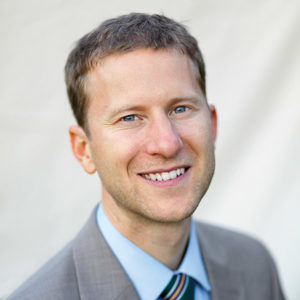
Oulahan first discovered the ups and downs of immigration law as a bilingual legal assistant working for a small immigration law firm in Milwaukee. He’s fluent in Spanish, a language he studied at Macalester while earning a degree in Latin American studies. His language skills improved during a study abroad program in Nicaragua and while working for a Head Start program in Oakland, Calif., after graduation. “The legal assistant work made an impact on me,” he says. “I’ve always been interested in using language as a way of working with and learning about other cultures.” The work was so meaningful, it inspired him to attend law school at Marquette University.
Last May, Oulahan started a solo practice, focusing on deportation defense, naturalization, and other immigration matters. His largest client group is from Mexico, but he serves immigrants from around the world.
“Speaking Spanish continues to be one of my biggest assets in working with clients,” Oulahan says. “It makes them more comfortable and gives them confidence in my abilities.” Oulahan also is on the board of several immigration law associations, works with the Marquette Volunteer Legal Clinic, and frequently presents on immigration issues at nonprofits, churches, and schools.
The Policy Advocate
SARAH CRAVEN ’85
Director, United Nations Population Fund (UNFPA), Washington, D.C.
Sarah Craven ’85 advocates for women worldwide on issues of reproductive and sexual health. When she sees photographs of healthy babies born to mothers around the world at UNFPA supported clinics, some in the midst of war zones or natural disasters, she is reminded that her work matters. “The photos tell the story of the importance of what we do, which is saving women’s and children’s lives,” Craven says.
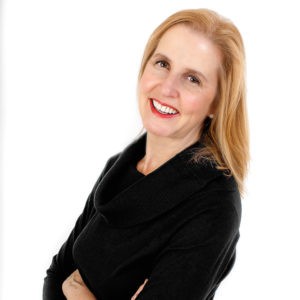 Craven promotes the UNFPA’s mission of universal maternal health to policymakers in Congress and the U.S. State Department. She also works with NGOs, the media, and funding sources to bring attention to reproductive health and rights issues, including providing access to family planning, preventing gender-based violence, and ending female genital mutilation and child marriages. Among these initiatives is UNFPA’s goal of achieving zero maternal deaths in childbirth by the year 2030. This goal is one of the U.N.’s 17 Sustainable Development Goals, which cover global issues ranging from poverty to climate change.
Craven promotes the UNFPA’s mission of universal maternal health to policymakers in Congress and the U.S. State Department. She also works with NGOs, the media, and funding sources to bring attention to reproductive health and rights issues, including providing access to family planning, preventing gender-based violence, and ending female genital mutilation and child marriages. Among these initiatives is UNFPA’s goal of achieving zero maternal deaths in childbirth by the year 2030. This goal is one of the U.N.’s 17 Sustainable Development Goals, which cover global issues ranging from poverty to climate change.
“The core of what we do is based in a woman’s right to determine if, when, and how many children she wants to have,” Craven says. “When women have full access to healthcare, they can complete their education and participate fully in their local and national economies.”
Besides advocating for the health and rights of women, UNFPA directs more concrete humanitarian efforts, such as providing sanitary napkins to schoolgirls in developing countries and clean childbirth delivery kits (a sheet of plastic, a razor blade, a piece of string, a bar of soap) to women who lack access to hospitals or other resources for the safe birth of their babies.
Even in the face of the Trump administration’s decision to eliminate U.S. funding for UNFPA, Craven remains optimistic: “In my 20 years of doing this work, I’ve never seen women’s rights discussed in such a personal yet universal way. Women are speaking up and demanding that their dignity and rights are respected— whether they live in Manhattan or Madagascar.”
The Scholar
KARLOS HILL ’02
Associate Professor of African and African American Studies, University of Oklahoma
Karlos Hill ’02 believes that historical scholarship—taken beyond the academy—can transform communities. As an expert on the black experience of lynching (his book, Beyond the Rope: The Impact of Lynching on Black Culture and Memory, was published in 2016) and America’s history of racial violence, Hill is particularly interested in how his work can help communities grapple with the legacy of historical events that happened in their midst. “I want my scholarship to be part of the effort to transform our understanding of and relationship to institutional racism and violence,” Hill says. “My goal is to create socially useful knowledge that applies to realworld problems and issues.”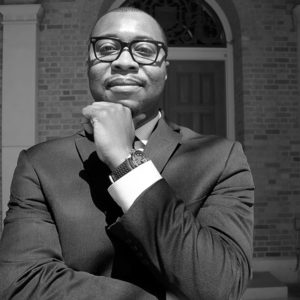
Hill serves on the Tulsa Race Riot Centennial Commission (that city’s 1921 riot was one of the deadliest in American history), which has been asked to raise awareness and promote racial reconciliation by examining the riot’s legacy. He founded the Tulsa Race Riot Summer Institute—to be taught in the Greenwood District, the site of the riot—to provide K-12 teachers with the tools and resources they need to teach about the riot in culturally appropriate and sensitive ways.
“We’re addressing Tulsa’s legacy of racial discrimination,” says Hill. He’s also an historical advisor to the Tulsa Public Schools’ community advisory council, which is considering changing the names of city schools that honor Confederate leaders. In addition, he co-hosts a podcast, Tapestry: Conversations about Race and Culture, which discusses issues surrounding justice, equality, and peace. Hill engages his students in the study of history by illuminating the contemporary relevance of historical people, events, and processes: “I use my lens as an African-Americanist to promote understanding of complicated histories and the way in which those histories connect to issues today.”
The Researcher
LISA PETERSON ’81
Professor, Division of Environmental Health Sciences, University of Minnesota
Program Co-leader, Carcinogenesis and Chemoprevention, Masonic Cancer Center
Lisa Peterson ’81 teaches graduate-level courses in toxicology and operates a research lab at the University of Minnesota. With a focus on investigating how environmental chemicals harm people, she’s currently working on two projects: the first looking at links between children’s exposure to chemicals and their health, and the second exploring the carcinogenic properties of chemicals other than nicotine in tobacco. Her second project is an especially sticky one, given that there are some 7,000 chemicals contained in tobacco smoke, 70 of which have been shown to be carcinogens. “If we propose lowering some of the constituents, such as NNN (a known esophageal carcinogen), but leave other chemical levels high, are we really impacting the carcinogenic risk of tobacco?” Peterson asks.
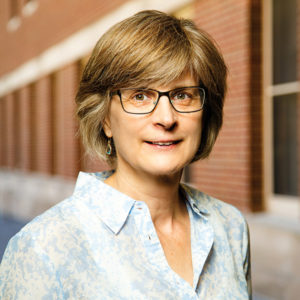 Although her research is in its beginning stages, Peterson hopes that her lab’s findings will someday inform FDA decisions on changing cigarette formulations to reduce harm to smokers. “Obviously, it would be best if no one smoked at all,” Peterson says, “but people do get addicted, so it’s good if we can make the product as safe as possible.”
Although her research is in its beginning stages, Peterson hopes that her lab’s findings will someday inform FDA decisions on changing cigarette formulations to reduce harm to smokers. “Obviously, it would be best if no one smoked at all,” Peterson says, “but people do get addicted, so it’s good if we can make the product as safe as possible.”
Peterson first discovered her love for scientific research at Macalester. She spent one summer in a University of Minnesota pharmacology lab growing cancer cells and treating them with a chemotherapeutic drug and another at Macalester working on an organic synthesis of a pine beetle pheromone to be used to reduce the bug’s destruction of trees.
The Judge
MARTHA MILLS ’63
Judge, Circuit Court of Cook County, Chicago, Illinois (retired)
When Martha Mills ’63 volunteered for the Lawyers’ Committee for Civil Rights Under Law in Mississippi in March 1967, she only intended to stay for a month, helping with smaller tasks so staff attorneys would be free to handle major civil rights cases. “I soon realized that they badly needed more good lawyers,” Mills says. “The injustices and inequalities were stunning, and I had no desire to live in a country where any group of people was not the equal of any other.”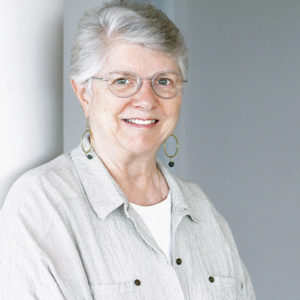
That is how Mills ended up trying hundreds of civil and criminal cases for the Lawyers’ Committee, both as a staff attorney in Mississippi and later as chief counsel in Cairo, Illinois. In 1968, she won the first jury verdict in Mississippi since Reconstruction for more than $1 million on behalf of the estate of a black man murdered by the Ku Klux Klan. Mills’s book, Lawyer, Activist, Judge: Fighting for Civil and Voting Rights in Mississippi and Illinois (ABA Publishing, 2015), details her civil rights work.
Mills has always been a trailblazer. She attended Macalester—graduating in three years—even though her parents thought girls shouldn’t attend college. In 1965, she became the first woman attorney hired at White & Case in New York City. She was a trial lawyer for more than 40 years, appearing in court, at least in the early days of her career, when women were generally not considered fit to do so. As a pioneering civil rights lawyer, she battled the systemic racism that disenfranchised blacks. “I just did what I thought was right and I used the legal system to do it,” she says.
In 1971, Mills moved to Chicago to continue working as a trial attorney and in 1989 became only the second woman from Illinois to be admitted to the American College of Trial Lawyers. She was appointed judge for the Circuit Court of Cook County from 1995-96 and again from 2008-12, when she retired. Mills started a pilot restorative justice program, one of the first such programs in a family law court, and she continues to advocate for its power to resolve conflicts.
Of her years in the South, Mills says: “I was part of an unprecedented and extraordinary effort. [The Civil Rights era] arose out of an urgent need for agreement between our values and our realities.”
The Microbiologist
GAUTAM DANTAS ’00
Associate Professor of Pathology and Immunology, Molecular Microbiology, and Biomedical Engineering, Washington University, St. Louis
Gautam Dantas ’00 oversees a research lab at Washington University that examines how bacteria—both good and bad—work together in communities. His team uses that knowledge to develop living organisms that can improve human health and to find new ways to fight antibiotic-resistant infections. “We study the group of bacteria that live in and on the human body, attempting to understand how those bacteria interact, how they evolve drug resistance, and how we might genetically modify particular versions of those bacteria to either maintain health or combat disease,” Dantas says.
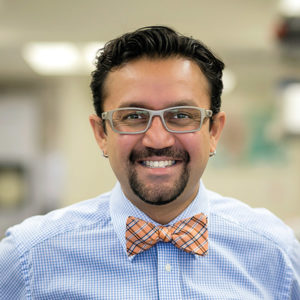 Most of the antibiotics used today to treat infectious disease were discovered between 1940 and 1960, Dantas notes. “We’ve slowed down in discovering new antibiotics, but bacteria haven’t slowed down in evolving resistance to those antibiotics,” Dantas says. His research team is motivated by sobering statistics: between 700,000 and 1 million people die each year from drug-resistant infections. Projected out to 2050, that number could reach as high as 10 million, Dantas says. “That’s an incredible human cost and an enormous economic cost with regard to treatment.”
Most of the antibiotics used today to treat infectious disease were discovered between 1940 and 1960, Dantas notes. “We’ve slowed down in discovering new antibiotics, but bacteria haven’t slowed down in evolving resistance to those antibiotics,” Dantas says. His research team is motivated by sobering statistics: between 700,000 and 1 million people die each year from drug-resistant infections. Projected out to 2050, that number could reach as high as 10 million, Dantas says. “That’s an incredible human cost and an enormous economic cost with regard to treatment.”
His lab has had some recent breakthroughs, including discovering a new treatment for MRSA, a particularly nasty staph infection that can enter the bloodstream and turn deadly. Through an improved understanding of drug resistance, says Dantas, his team came up with a combination of three older drugs that can kill MRSA and prevent it from evolving new resistance. Last year, Dantas cofounded Viosera Therapeutics to bring the triple antibiotic treatment for MRSA quickly to market, as well as to eventually sell other novel microbial products.
The Teacher
ELIZA RASHEED ’06
Theater teacher, Linwood Monroe Arts Plus Upper Campus, St. Paul Public Schools
Independent theater artist-performer Eliza Rasheed ’06 has always loved theater, but as a multiracial woman, she hasn’t always seen herself reflected on stage. “I got into performing to figure out the story I wanted to tell,” she says. “I felt there was a need for complex narratives to be told.”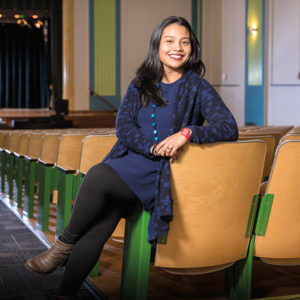
At Macalester, Rasheed’s mentor and theater professor, Harry Waters Jr., introduced her to wider-ranging voices, including plays by Asian American women. “Reading those monologues made a profound impression on me,” she says. “I began to realize that I could be a playwright and use theater as a way to transform communities.”
When Rasheed was hired eight years ago at Linwood Monroe—an arts-focused public grade school with a diverse student body—she came with a powerful vision for the school’s theater program: To transform it into one culturally relevant for the fourth through eighth graders she teaches in the classroom and directs in the after-school theater program. “I want my students’ voices to be validated,” Rasheed says, “and for them to use their voices to talk about social issues they care about.”
Rasheed’s older students write and perform plays about issues such as racism, gun control, global warming, and mental health both at Linwood Monroe and throughout the Twin Cities. Her younger students learn ways to contribute positively to their environments and to effectively interact with all types of people, using theater as the backdrop for these lessons.
“Theater helps us find hope among these big issues,” Rasheed says. “It’s about creating safe spaces for conversations to happen and for holding multiple truths. I want my students to learn that theater isn’t always about seeing eye-to-eye, but about opening themselves up to differing perspectives and new experiences.”
Marla Holt is a freelance writer based in Owatonna, Minn.
February 2 2018
Back to top




